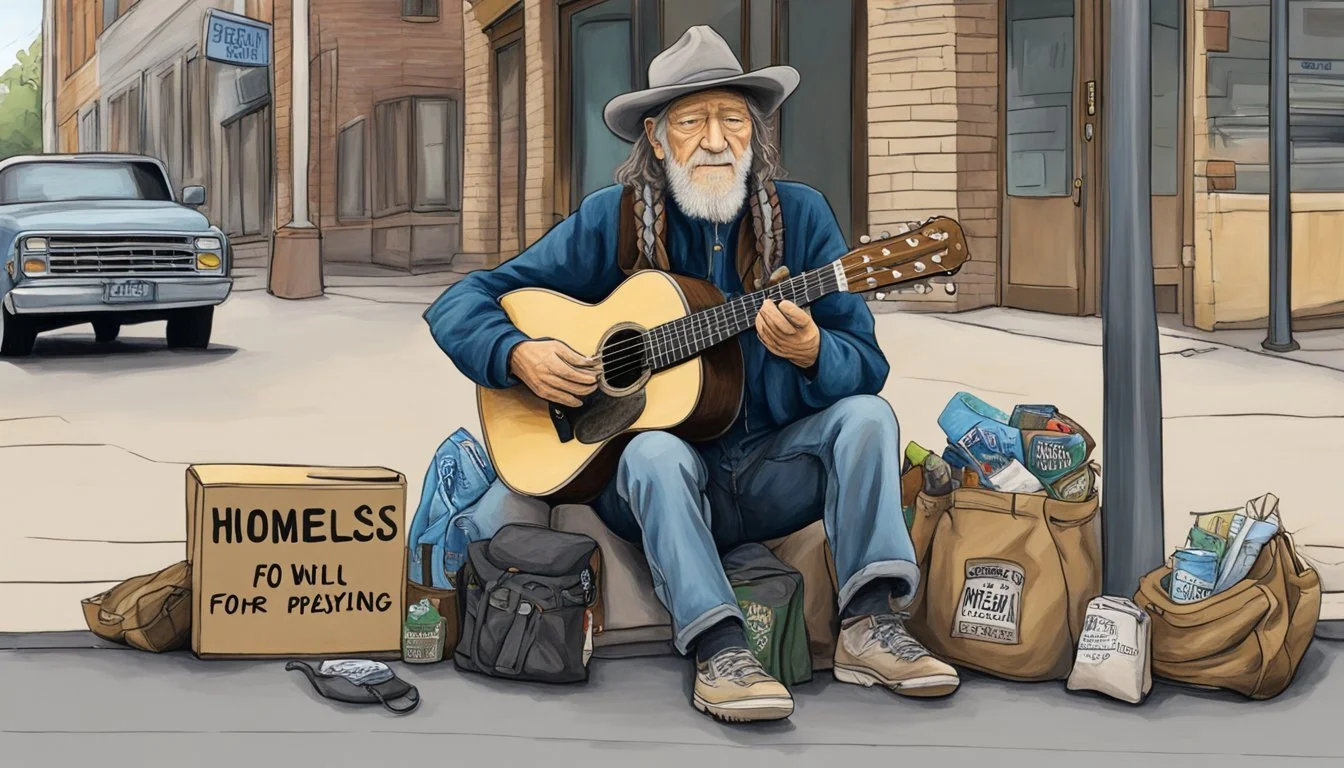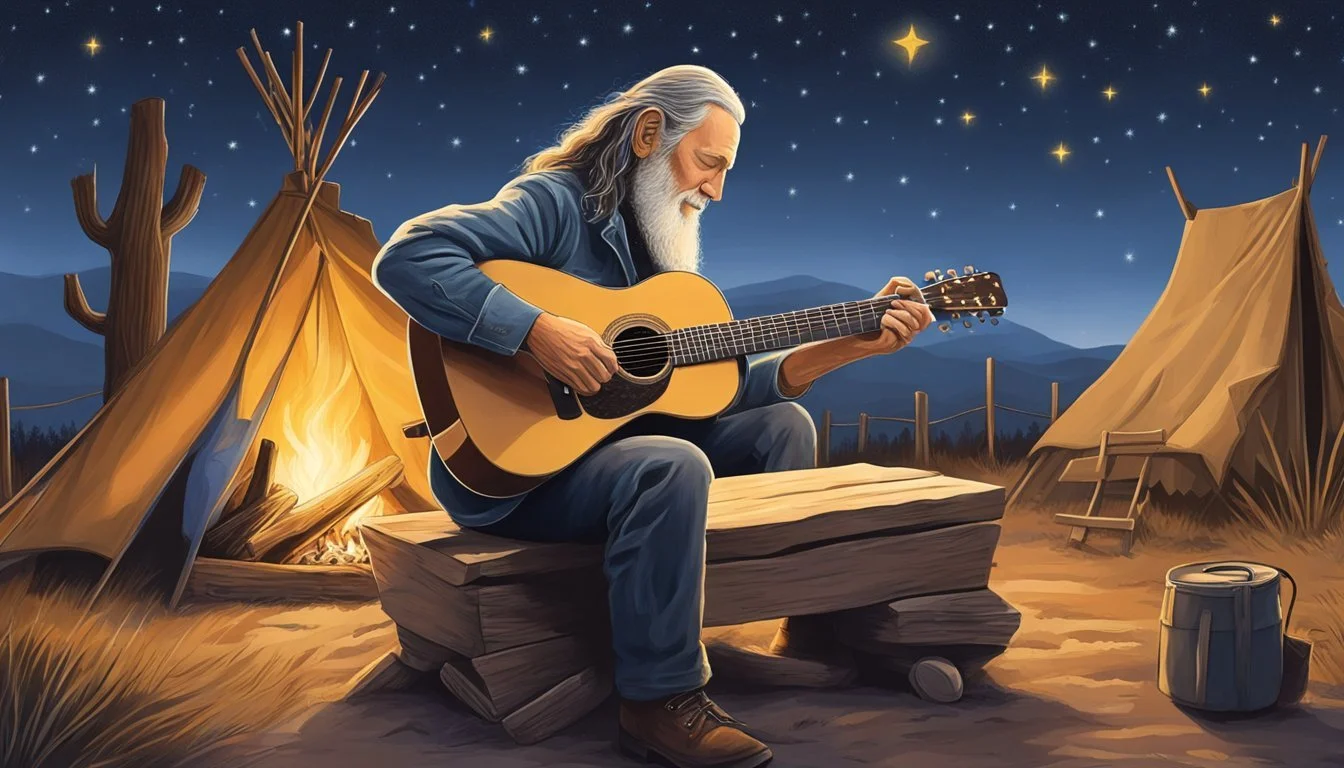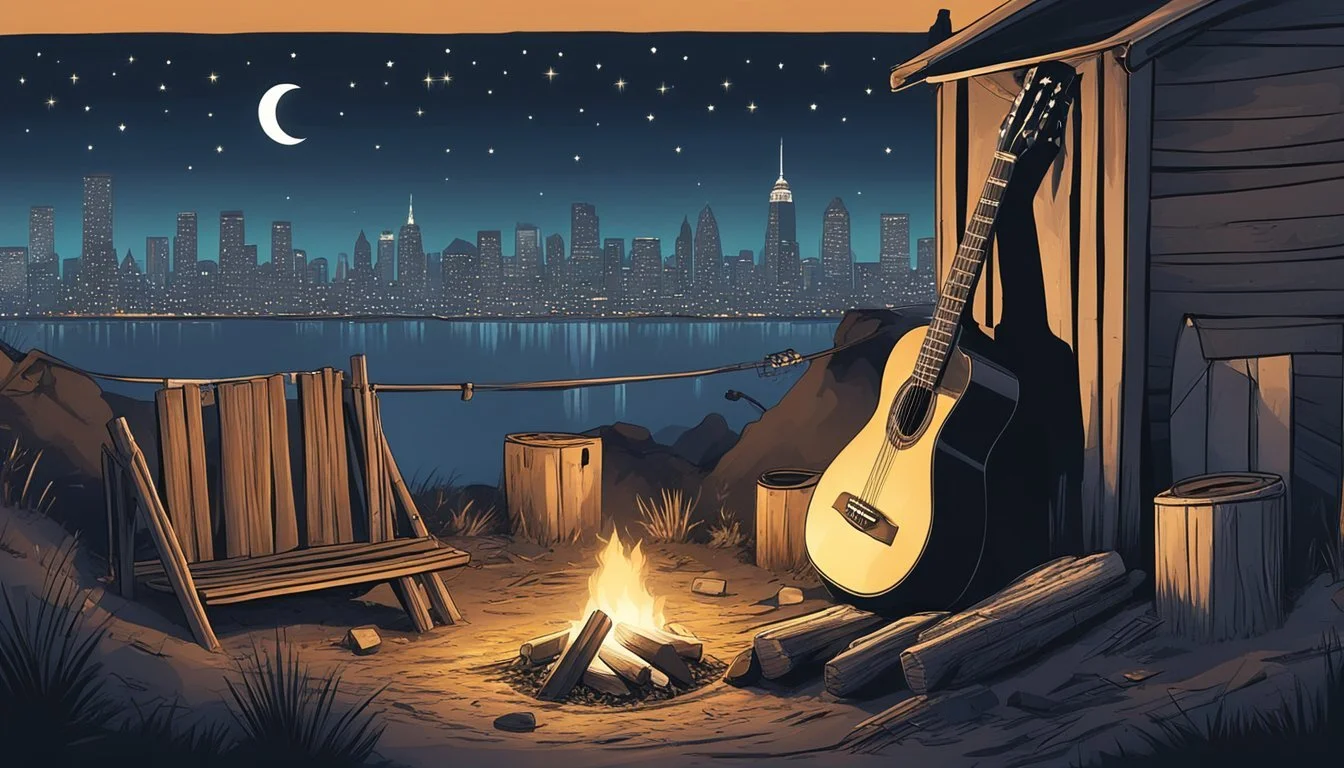Willie Nelson Homelessness: The Country Legend's Inspiring Fight Against Adversity!
Willie Nelson, the legendary country music icon, has faced his share of struggles throughout his career, including a brush with homelessness. In 1990, the Internal Revenue Service seized most of Nelson's assets to collect $16.7 million in unpaid taxes. This financial crisis left Nelson on the brink of homelessness, forcing him to rely on his music and creativity to rebuild his life and career.
Nelson's experience with near-homelessness became a pivotal moment in his life, inspiring songs and shaping his perspective on wealth and success. The singer-songwriter's resilience in the face of adversity resonated with many of his fans, particularly those who had experienced similar hardships. Nelson's ability to bounce back from financial ruin and continue creating music serves as a testament to his enduring spirit and talent as a musician.
Early Life and Musical Beginnings
Willie Nelson's journey to musical stardom began in rural Texas, shaped by family influences and early songwriting talents. His path to success involved humble beginnings, formative experiences, and a breakthrough hit that launched his career.
Texas Roots and Family
Willie Nelson was born on April 29, 1933, in Abbott, Texas. Raised by his grandparents after his parents separated, Nelson grew up in a musical household. His grandfather bought him his first guitar at age six and taught him basic chords.
Nelson's sister Bobbie also played piano, and together they formed a musical duo. The siblings performed at local events and churches, honing their skills from an early age.
First Song and Early Career
At just seven years old, Nelson wrote his first song. This early demonstration of songwriting talent foreshadowed his future as a prolific composer. By age nine, he was performing in a local band, gaining valuable stage experience.
Nelson's teenage years saw him working various jobs while continuing to pursue music. He played in honky-tonks and dance halls across Texas, developing his unique style and building a local following.
Breakthrough with 'Crazy'
Nelson's big break came in 1961 when Patsy Cline recorded his song "Crazy." The track became a massive hit, reaching #2 on the country charts and crossing over to pop success.
This accomplishment established Nelson as a formidable songwriter in Nashville. It opened doors for him in the music industry and paved the way for his own recording career.
"Crazy" remains one of the most popular jukebox songs of all time, showcasing Nelson's ability to craft emotionally resonant lyrics and memorable melodies.
Success in Country Music
Willie Nelson's rise to stardom in country music was marked by innovative songwriting, a distinctive vocal style, and a rebellious spirit. His career took off in the 1970s and 1980s as he helped define the outlaw country movement and released several landmark albums.
Outlaw Country Movement
Willie Nelson played a pivotal role in the outlaw country movement of the 1970s. This genre rejected the polished Nashville sound in favor of a rougher, more authentic approach. Nelson's unconventional style and refusal to conform to industry norms made him a leader in this movement.
He grew his hair long, sported a bandana, and openly smoked marijuana - all of which defied country music's conservative image. Nelson's music blended elements of rock, folk, and jazz with traditional country, creating a unique sound that resonated with a wide audience.
'Red Headed Stranger' and 'Blue Eyes Crying in the Rain'
In 1975, Nelson released his breakthrough concept album "Red Headed Stranger." The sparse, stripped-down production was a stark departure from the lush Nashville sound. Initially met with skepticism by his record label, the album became a massive critical and commercial success.
"Blue Eyes Crying in the Rain," a cover of a Fred Rose song from the album, became Nelson's first number-one hit as a singer. The song's success catapulted Nelson to superstardom and earned him his first Grammy Award for Best Male Country Vocal Performance.
Collaborations and Acclaim
Nelson's collaborative spirit led to numerous successful partnerships. He formed The Highwaymen supergroup with Johnny Cash, Waylon Jennings, and Kris Kristofferson in 1985. Their albums and tours were hugely popular, further cementing Nelson's status as a country music icon.
His duets with artists across genres, from Julio Iglesias to Snoop Dogg, showcased his versatility. Nelson's 2014 album "Band of Brothers" featured his first batch of newly written songs in nearly two decades. It debuted at number one on the Billboard Top Country Albums chart, proving his enduring appeal and relevance in the industry.
Activism and Philanthropy
Willie Nelson's commitment to social causes extends far beyond his music. He has dedicated significant time and resources to addressing homelessness and supporting farmers in need.
Farm Aid and Support for Homeless Shelters
Willie Nelson co-founded Farm Aid in 1985, an annual benefit concert that has raised over $60 million to support family farmers and sustainable agriculture. The organization also helps establish food banks in rural areas, addressing hunger and food insecurity.
Nelson's philanthropic efforts extend to homeless shelters as well. He has donated proceeds from concerts and album sales to support shelters across the United States. In his hometown of Austin, Texas, Nelson has been a long-time supporter of local initiatives providing housing and resources for those experiencing homelessness.
His Farm Aid concerts often feature educational components about homelessness and poverty in rural communities, raising awareness among attendees.
Advocacy for Homeless Youth
Nelson has been a vocal advocate for homeless youth, using his platform to spotlight this often-overlooked issue. He has partnered with organizations focused on providing shelter, education, and support services to young people living on the streets.
In 2018, Nelson headlined a benefit concert for a youth homeless shelter in Seattle, raising substantial funds and drawing attention to the plight of homeless teenagers. He has also supported mentorship programs that aim to break the cycle of homelessness among young people.
Nelson frequently speaks out about the need for more comprehensive support systems for homeless youth, including access to mental health services and job training programs.
Live Aid Participation and Other Causes
Willie Nelson participated in the historic Live Aid concert in 1985, joining a global effort to address famine in Ethiopia. This experience further fueled his commitment to using music as a tool for social change.
Beyond Live Aid, Nelson has lent his voice to various humanitarian causes. He has performed at benefit concerts for disaster relief efforts, including those supporting communities affected by hurricanes and wildfires.
Nelson's activism also extends to environmental causes, often intertwining with his work on homelessness and poverty. He advocates for sustainable living practices that can help reduce economic disparities and create more stable communities.
Personal Struggles
Willie Nelson faced numerous challenges throughout his life and career. These hardships tested his resilience but ultimately shaped him into the iconic figure he is today.
Drug Addiction and Recovery
Willie Nelson's battle with substance abuse spanned decades. He openly admitted to heavy marijuana use and struggled with alcohol addiction. These habits strained his personal relationships and impacted his health.
In the 1970s, Nelson's drug use escalated. He experimented with cocaine and became dependent on it. His addiction affected his performances and decision-making.
Nelson eventually recognized the toll drugs were taking on his life. He made efforts to quit cocaine in the 1980s. Though he continued using marijuana, he reduced his alcohol consumption significantly.
His journey to sobriety was gradual. Nelson credits his family's support and his passion for music as crucial factors in his recovery. He has since become an advocate for marijuana legalization.
Bankruptcy and Legal Issues
Financial troubles plagued Nelson in the early 1990s. The Internal Revenue Service (IRS) hit him with a $16.7 million tax bill in 1990. This massive debt stemmed from years of unpaid taxes and questionable investments.
Nelson's assets were seized, including his Texas ranch and recording studio. He faced potential criminal charges for tax evasion. The situation forced him to sell many possessions and properties.
Legal battles ensued as Nelson worked to negotiate with the IRS. He claimed his accountants had mismanaged his finances. The ordeal lasted several years, putting immense stress on Nelson and his career.
The IRS Tapes: Financial Recovery
In a creative approach to his financial crisis, Nelson released "The IRS Tapes: Who'll Buy My Memories?" in 1992. This album was a direct response to his tax troubles.
The concept was simple: sell enough albums to pay off his debt. Nelson promoted it through infomercials and appealed to fans for support. Each album sold contributed to reducing his IRS bill.
This innovative strategy, combined with asset sales and touring, helped Nelson chip away at his debt. By 1993, he had negotiated his bill down to $9 million. Through persistent effort and fan support, Nelson fully settled his IRS debt by 1995.
The experience inspired several songs and became part of Nelson's lore. It demonstrated his resilience and ability to overcome adversity through music.
Career Beyond Music
Willie Nelson's talents extend far beyond his musical achievements. He has made notable forays into acting, literature, and business ventures, showcasing his versatility as an entertainer and entrepreneur.
Willie Nelson the Actor
Nelson's acting career spans several decades, with appearances in over 30 films and television shows. He made his film debut in the 1979 drama "The Electric Horseman" alongside Robert Redford and Jane Fonda. Notable roles include a lead part in "Honeysuckle Rose" (1980) and appearances in "Wag the Dog" (1997) and "The Dukes of Hazzard" (2005).
His on-screen presence often reflects his laid-back persona and musical background. Nelson has also lent his voice to animated projects, including "The Simpsons" and "King of the Hill."
Literature and Autobiography
Nelson has authored or co-authored several books, sharing his life experiences and wisdom. His autobiography "Willie: An Autobiography" was published in 1988, offering insights into his personal life and career. He followed this with "The Facts of Life: And Other Dirty Jokes" in 2002.
Other notable works include:
"Roll Me Up and Smoke Me When I Die: Musings from the Road" (2012)
"It's a Long Story: My Life" (2015)
"Letters to America" (2021)
These books showcase Nelson's storytelling abilities and provide fans with a deeper understanding of his life philosophy.
Business Ventures and Branding
Willie Nelson has leveraged his fame to launch various business ventures. In 2015, he introduced "Willie's Reserve," a cannabis brand reflecting his long-standing advocacy for marijuana legalization. The brand offers a range of cannabis products in states where it is legal.
Nelson also co-founded BioWillie Biodiesel in 2004, a company producing biodiesel fuel from vegetable oil. Though the venture faced challenges, it demonstrated his commitment to environmental causes.
His brand extends to merchandise, including guitar accessories and clothing lines. These ventures capitalize on Nelson's iconic status while aligning with his personal values and interests.
Cultural Impact and Legacy
Willie Nelson's influence extends far beyond music, shaping American culture and inspiring generations of artists. His unique style and advocacy work have cemented his status as a cultural icon.
Influence on Country Music and Artists
Willie Nelson revolutionized country music with his distinctive sound and songwriting. His album "Red Headed Stranger" in 1975 marked a turning point, blending traditional country with rock and folk elements. This approach paved the way for the outlaw country movement.
Nelson's songs like "Crazy" and "On the Road Again" became timeless classics, covered by numerous artists across genres. His storytelling ability and emotive vocals influenced countless musicians, from Kris Kristofferson to Chris Stapleton.
His unconventional career path, moving from Nashville to Austin, inspired artists to forge their own paths in the industry. Nelson's success encouraged musicians to challenge industry norms and pursue artistic authenticity.
Recognition and Awards
Willie Nelson's contributions to music have earned him widespread acclaim and numerous accolades. He has won 12 Grammy Awards, including the Lifetime Achievement Award in 2000.
Nelson was inducted into the Country Music Hall of Fame in 1993, recognizing his significant impact on the genre. He also received Kennedy Center Honors in 1998 for his lifetime contributions to American culture.
Other notable awards include:
Multiple Country Music Association Awards
Several Academy of Country Music Awards
Induction into the Songwriters Hall of Fame
These honors reflect Nelson's enduring influence as both a performer and songwriter in American music.
Assessment by Peers and Critics
Fellow musicians and critics consistently praise Willie Nelson's artistry and cultural significance. Merle Haggard once called him "the greatest musical stylist I've ever heard."
Music critics often highlight Nelson's ability to transcend genre boundaries. His collaborations with artists from various backgrounds, including Julio Iglesias and Snoop Dogg, showcase his versatility and wide-ranging appeal.
Nelson's longevity in the industry is frequently noted, with many praising his continued relevance and creativity well into his 80s. His advocacy work, particularly for family farmers through Farm Aid, has also earned him respect beyond musical circles.
Critics often point to Nelson's authenticity and unique vocal style as key factors in his enduring popularity and influence.
Willie Nelson and the Pacific Northwest
Willie Nelson's early career took an unexpected detour through the Pacific Northwest in the mid-1950s. This period shaped his musical journey and left a lasting impact on the region's country music scene.
Portland and the Western Express
Willie Nelson arrived in Portland, Oregon in 1956 at the age of 23. He quickly immersed himself in the local music community. Nelson performed at venues throughout the city, including a now-defunct dance hall on 82nd Avenue.
The young musician gained exposure playing with Rusty Meyers' Western swing band. This group was considered one of the best in the Northwest at the time. Nelson's performances helped refine his songwriting skills and stage presence.
Kvan and the Disc Jockey Years
Nelson's time in the Pacific Northwest centered around his role as a disc jockey at KVAN radio in Vancouver, Washington. He hosted the "Western Express" show, introducing himself daily with a colorful, self-deprecating description.
On air, Nelson played country music and promoted local concerts. This experience allowed him to network with other musicians and industry professionals. It also provided a steady income while he pursued his songwriting ambitions.
Nelson's stint at KVAN lasted until the late 1950s. During this time, he honed his broadcasting skills and expanded his musical knowledge.
Musical Influence and Local Impact
Willie Nelson's presence in the Pacific Northwest left a lasting impression on the region's country music scene. His performances and radio show introduced audiences to emerging country artists and classic tunes.
Nelson's own songwriting flourished during this period. He penned several songs that would later become hits. The connections he made in Portland and Vancouver helped launch his recording career.
In 1956, Nelson cut his first single near Vancouver. This marked a significant milestone in his journey to becoming a country music icon. The Pacific Northwest chapter of Willie Nelson's life played a crucial role in shaping his future success.









